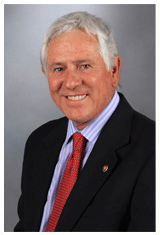JEFFERSON CITY — Understanding ballot initiatives that invariably pop up during the August and November elections can be both challenging and frustrating for voters. Explaining sometimes complicated and controversial issues in 100 or fewer words can be difficult and confusing to the point that voters don’t know what a “yes” or “no” vote actually means. This can be further complicated by advocacy and interest groups that seek to have the ballot language written to tip the scales in their favor. In this report, I will attempt to present the initiatives as I see them and encourage you to further your research by visiting www.sos.mo.gov/elections/2014ballot/ where you can read the actual ballot language and a summary.
Amendment 2
Amendment 2 is in response to a Missouri Supreme Court ruling in 2007 that prohibits the use of “propensity evidence” in criminal legal proceedings. Propensity evidence is evidence that an accused has demonstrated a propensity to offend in like manner to the crime for which he/she is being tried. Missouri’s restriction has increased the difficulty of successfully prosecuting child sexual predators in that it bars prosecutors from telling jurors about prior criminal sex acts in nearly all cases against accused child predators. This is an important change to state law that will help ensure that Missouri’s children are protected and those who commit crimes against them can be successfully prosecuted. The federal government and nearly all other states allow “propensity evidence” and a “yes” vote will add Missouri to that list.
Amendment 3
Amendment 3 is on the ballot by way of a citizen initiative petition and is perhaps the most controversial of the measures on the ballot. It would eliminate teacher tenure in Missouri and introduce a teacher-evaluation system connected to student performance data. Proponents contend the measure will reward good teachers and make it easier to get rid of ineffective ones. Opponents believe the measure is a one-size-fits-all approach that would cost more money, lead to more standardized tests, and create a system of evaluating teachers that is not truly representative of their ability or work ethic. A “yes” vote would institute the new system and a “no” vote would continue the current education system as it is.
Amendment 6
Amendment 6 would create an early voting period in Missouri period of six business days before election day, excluding Saturday and Sunday. Other proposals promoted by national progressives would push early voting out as far as six weeks before the election, would come at significant costs to taxpayers and be extremely difficult for local election officials to manage. I have serious concerns about early voting proposals. One of the most sacred rights of Missourians is the right to vote and, instead of creating never-ending voting periods, we should exercise our civic duty and get out and vote on Election Day.
Amendment 10
Amendment 10 is perhaps the one that will most directly affect your state government day-to-day. It would change the process by which the governor is able to make restrictions and withhold funding in the state budget. As we have seen, our current governor often uses the budget as a political tool to force legislative action that has nothing to do with the responsibility to balance our state budget. The governor targets important budget items, like public education with his withholds to draw more attention and put pressure on lawmakers to bow to his wishes. Budget withholds is an area where the governor has nearly unrestricted power and we should have a mechanism by which that power can be checked. If Amendment 10 passes, the Legislature could override budget withholds by the governor similar to the way we can override a veto. Amendment 10 would also prohibit the governor from forecasting revenues based on what the General Assembly may do. He has to budget based on the facts and the current budget situation, not one of his own imagination. A “yes” vote would create this new process while a “no” vote would maintain the status quo.
As always, I welcome your ideas, questions and concerns about Missouri government. You may contact me at the State Capitol as follows: (573) 751-1480, david.sater@senate.mo.gov or by writing to Sen. David Sater, Missouri State Capitol, Room 433, Jefferson City, MO 65101. |



